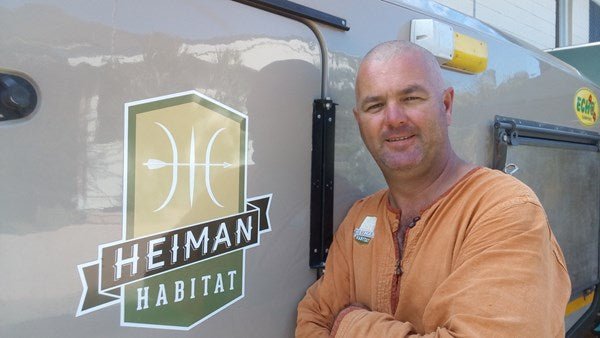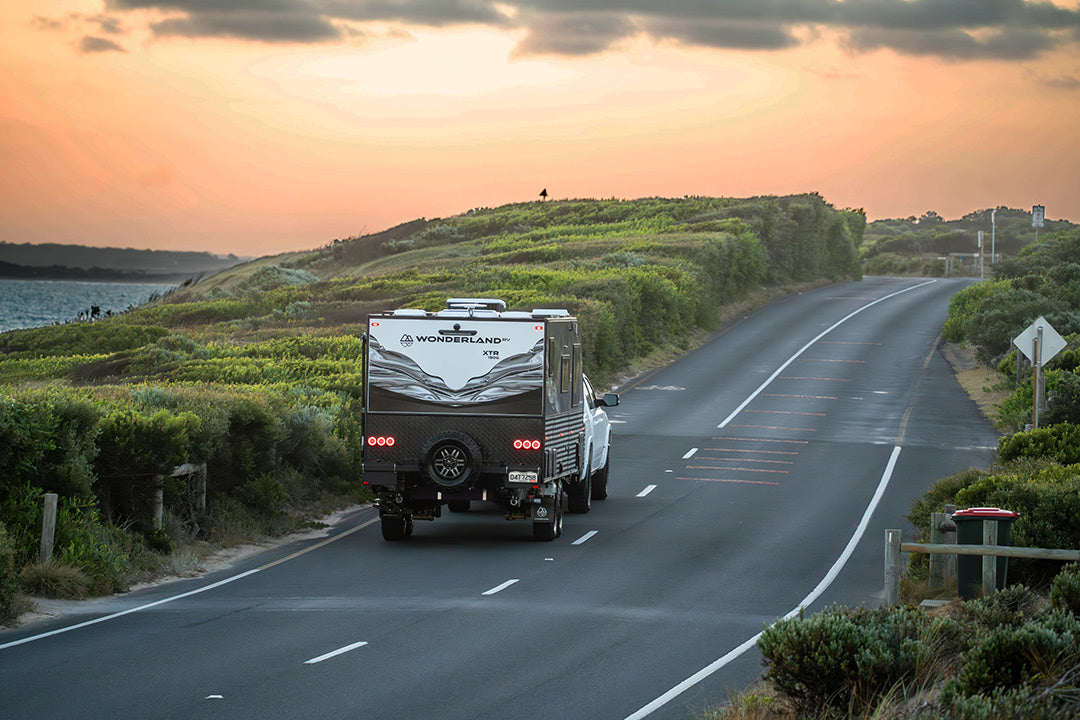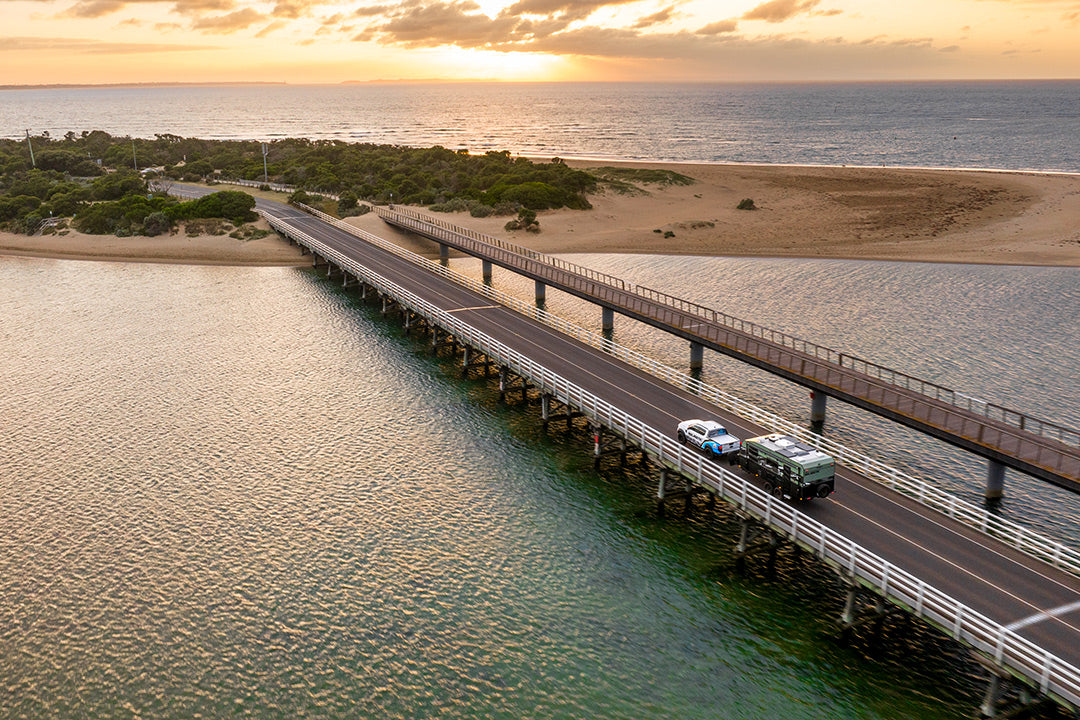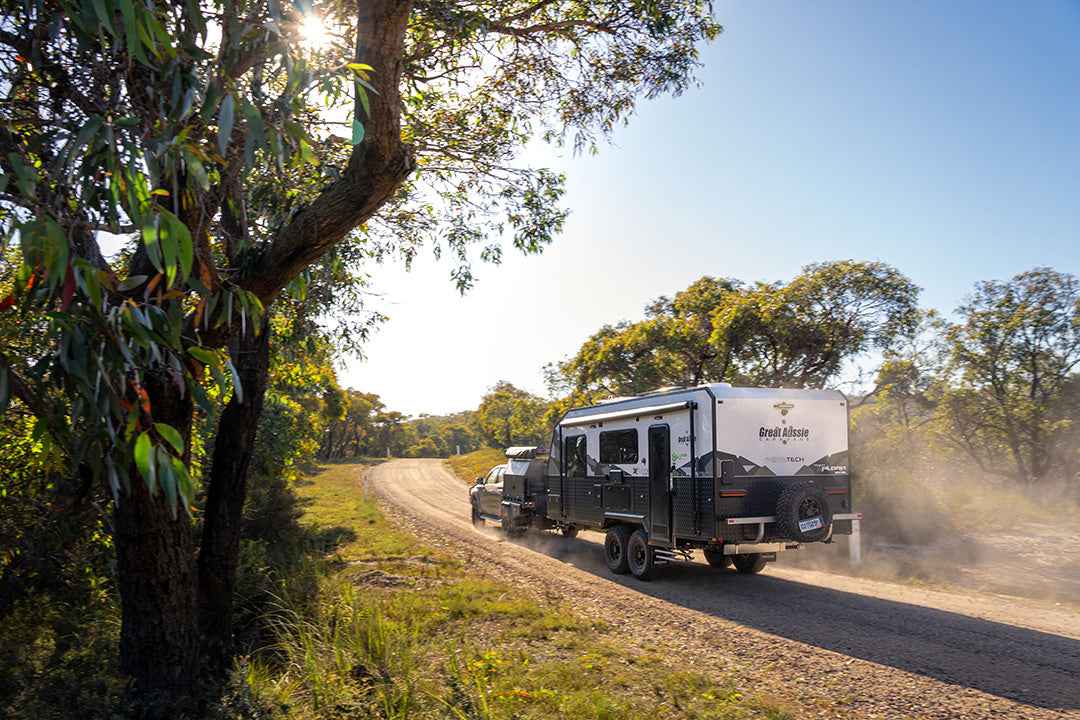Get Offroad Ready

Your rig might be tough and you may be too. But are you prepared for ‘What If?’
If you plan to stick to the highways every time you travel—and can’t go anywhere without missing an episode of Home and Away—turn to the next article now. Otherwise, you might want to keep reading. We’re here to think about the unthinkable, the times when your plans go out the window in the face of Mother Nature’s strange sense of humour or when an incident occurs that you’d never really expected.
In these situations, it doesn’t matter how tough your tow-tug and trailer are. If you’ve prepped for a weekend at the beach when you’re actually in the middle of a four-week trip to the Red Centre, you’re likely to find yourself in a mess, wondering why you hadn’t prepared better before you left home.
So, ask yourself: what If? What if I break down? What if it happens when I’m up a secluded back track? If your best response option involves ‘phoning a friend’ on your mobile you’re dead wrong.
Mobile phone reception covers 90 per cent of the population not 90 per cent of the country. So you either need to ensure you’re carrying a satellite phone and/or Personal Locating Beacon (PLB) when you get off-grid, or you need to know how to keep you and you’re family safe—potentially for an extended period of time if you’re in remote country.
To be ready for anything means (as our mates in the US would say)—“you gatta be packed for bear, man”. And that means having back up plans on your back up plans.
Consider this: would you partake in a 4WD training course before you head scrub? What about a caravan towing course, as well? While you may have been been driving for decades—including in rough terrain—are you prepared for the conditions you’re likely to find in the places you plan to go next? Are you driving a new 4WD that you haven’t taken outside metropolitan areas before? And do you really understand how your trailer (and its load) is likely to respond on rough tracks? If you don’t fully understand your rig and its performance limitations, you may readily find yourself out scrub and up to your axles in it.
BE READY FOR ANYTHING
Picture yourself for a moment travelling in remote Western Australia. You break down or get lost without a sat phone or PLB. How long do you think it may take before ‘the Cavalry’ arrives to get you out of trouble? Causes of your problems could range from a blown engine, a snapped axle, to the third flat tyre or blow-out in a row. What’s your Plan A response? And what about your Plan B?
And consider the potential for getting caught in flood. Depending on where you travel and the time of year, it’s possible you may be stuck in one place for days or even a week, waiting for the water levels to subside. Do you have enough ‘contingency food’ on-board to deal with it? And what about clean water? It’s important to pack at least 72 hours of emergency rations if you plan to travel remotely. And make sure your emergency rations are hidden away so they’re not dissipated accidentally in day-to-day use.
SITUATIONAL AWARENESS
Being aware of what’s going on around you is one of the most important elements of staying safe. So, where possible, stay tuned into the local radio so you better understand what’s going on in the environment. This way you can keep informed of potential weather events, road closures, fire risk or other events that may turn a day on the road into a day of unexpected, and potentially life threatening challenges.
We like to carry the Traveller’s Guide to ABC radio. This credit card sized folded sheet lists the frequencies for many services including ABC National, Local, Classic FM, Triple J and ABC News Radio. We know there’s an app for this also but if you consider the 90 per cent rule about mobile phone coverage you may not be able to access it when required. Hard copy documents work anywhere. You don’t need to spend time searching the radio frequencies for a reasonably strong signal. With the Guide, you can dial-in manually to your nearest regional frequency. Phone ABC Reception advice on 1300 13 9994 for more.
Alternatively, refer to the frequency finder for the stations near your intended destinations before you leave.
LET'S GET PHYSICAL
Servicing your tow-tug is a no-brainer. Every 5,000km, conduct a lube service followed by your Book service. After all, your beloved tow tug is probably giving it all she’s got because you have her riding close to the GMV/ATM that was set by the design engineers.
And how have you been treating your camper and caravan? Have these vans been getting the love they need? For example, consider how often you rotate your trailer’s tyres, check and replace brake pads, lube nibs, bearings, service the air-con and so on. Then there are the owner obligations around maintaining seals and rivets. Even with a good maintenance regime, a few good vibrations can cause problems. Something as simple as leaving a door locked but ajar with poor seals will get us dirty and bothered on the road. Or perhaps our van isn’t a debutante any more: how are the seals between her joints? Are they letting in water, promoting mould and short circuiting the whole rig? What if they are? You can't address it unless you check.
SUSPENSION, SUSPENSION, SUSPENSION
Talking of good vibrations, we’ve heard of many tourers going scrub for the first time after years of highway travelling, only to find a cupboard or other fixture crumpled on the floor when they arrive at a destination. We’ve seen with our own eyes a van picked up new from a showroom, packed that day to travel 1,000km, with every cupboard shaken to the floor from its wall mounting at the end of the trip.
Now some of these incidents may occur due to improper fitting by the manufacturer. But others result from kilometre-after-kilometre of travel when vans cop beatings over corrugations. So if you see cracks or faults in fittings get them inspected by a caravan repairer before you leave home. Equally importantly, fit high quality suspension to your rig and maintain the correct tyre pressure for the conditions.
HYDRATION, HYDRATION, HYDRATION
Modern caravans can come with showers, washing machines as well as the kitchen sink. Now, this is all good when water is readily accessible. But if you can’t rely on replenishing your H2O stocks, plan forward because you need to have sufficient water on-board to support your health, and your family’s. While some people can survive for long periods without food, our bodies are ill-equipped to cope with dehydration. At the very least, dehydration detrimentally affects decision making and reduces coordination—both essential skills when you’re trying to deal with an emergency situation. At worst, it kills us.
Both the Australian and NZ Governments advise that adult men should drink 2.6L of water per day (about 10 cups) and adult women should drink 2.1L per day (about eight cups). And these stats don’t take into account the additional water that we’ll need to consume if we’re involved in hot weather activity while bush walking, gold prospecting, fishing and so on. Consider too that, if you’re a ‘Meat-o-Saurus’ (someone with a high protein diet) your kidneys need more fluid to help process the high quantities of protein. So your water intake may need to be more.
With these considerations in mind, it pays to carefully look at what measures we can take to conserve water. So only use your rig’s shower and washing machine when water is plentiful. After all, a 12V shower can use between 4-10 litres per minute. With two people on-board having a four minute shower, that could account for anything from 32 to 80L of water each day—or 560L of usage a week! At that rate, a 100L water tank doesn’t look very big at all.
Also think about back-up water options. If your water tank leaks, or its fittings are dislodged by fallen branches in a sclerophyll forest, or a rock along the Great Sandy Desert, you may find yourself high and dry. This is where multi-tank systems come in handy. Having a secondary water tank and jerries ensures you’ll have enough of the precious stuff when the brown-stuff hits the fan.
MAP BEFORE APP
The problem with today’s devices is our inherent reliance on them. Sure, the voice from the in-dash navigation unit will direct you but it’s important we can still navigate without electronic assistance. Reports of people becoming lost 100m from their own van underscore how much we’re losing our natural sense of direction.
GPS is a guide for navigation not the “Be all and end all”. So invest in a quality topographical map and learn what is around you by studying it. Get back into a habit of looking for the Southern Cross and working out where south is. Note the rise and fall of the sun—not only because it helps you determine where to position the rig’s solar panel, but because it’s an important navigational skill in its own right. For example, can you rely on yourself to know where the main road is every time you stop, regardless of where you are? This sort of situational awareness could save your life when the chips are down and you’re face to face with “What now?”.






